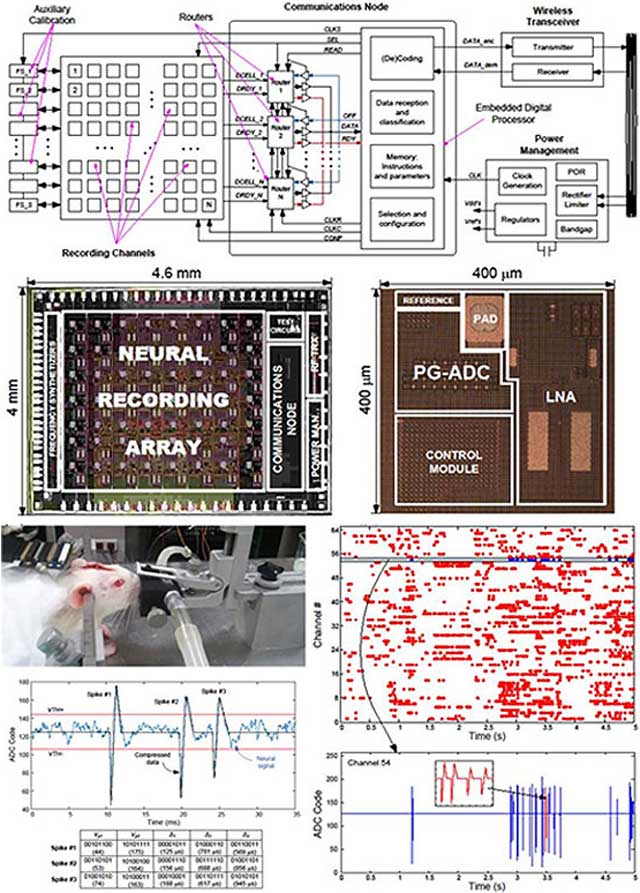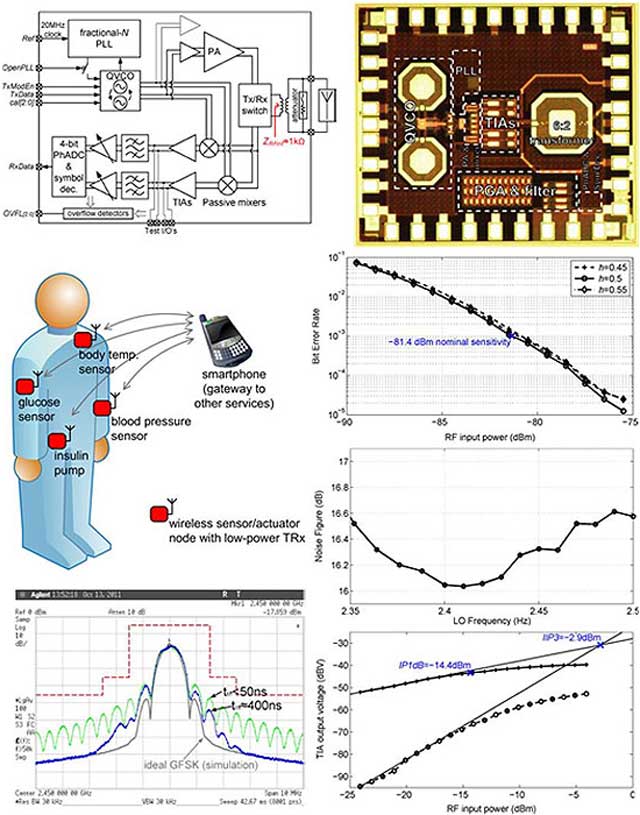

Biomedical and Bioinspired Circuits and Systems
Research on bioengineering including integrated sensing/read-out circuitry for the detection and recording of neural signals, wearable electronic devices for healthcare monitoring, and efficient wireless interfaces for intelligent medical devices (IMD). The common denominator to these research lines is the need to achieve high precision, low-noise analog read-out and very low power dissipation, in order to enable solutions which can be powered through small-capacity batteries and/or harvesting techniques.
Different activities are being developed in this area:
More details can be found in www2.imse-cnm.csic.es/~mandel/


R. Fiorelli, M. Delgado-Restituto and Á. Rodríguez-Vázquez, "Charge-Redistribution Based Quadratic Operators for Neural Feature Extraction", IEEE Transactions on Biomedical Circuits and Systems, vol. 14, no. 3, pp. 606-619, 2020 » doi
J. L. Valtierra, M. Delgado-Restituto, R. Fiorelli and Á. Rodríguez-Vázquez, "A Sub-µW Reconfigurable Front-End for Invasive Neural Recording that Exploits the Spectral Characteristics of the Wideband Neural Signal", IEEE Transactions on Circuits and Systems I: Regular Papers, vol. 67, no. 5, pp. 1426-1437, 2020 » doi
R. Fiorelli, M. Delgado-Restituto and Á. Rodríguez-Vázquez, "Offset-Calibration with Time-Domain Comparators using Inversion-Mode Varactors", IEEE Transactions on Circuits and Systems II: Express Briefs, vol. 67, no. 1, pp. 47-51, 2020 » doi
M. Delgado-Restituto, J. B. Romaine and Á. Rodríguez-Vázquez, "Phase Synchronization Operator for On-Chip Brain Functional Connectivity Computation", IEEE Transactions on Biomedical Circuits and Systems, vol. 13, no. 5, pp. 957-970, 2019 » doi
M. Delgado-Restituto, A. Rodríguez-Pérez, A. Darie, C. Soto-Sánchez, E. Fernández-Jover and Á. Rodríguez-Vázquez, "System-Level Design of a 64-Channel Low Power Neural Spike Recording Sensor", IEEE Transactions on Biomedical Circuits and Systems, vol. 11, no. 2, pp. 420-433, 2017 » doi
MIRABRAS: Millimeter-sized Implant with embedded Responsive Artificial intelligence for Brain disorder Assistance (PID2019-110410RB-I00)
PI: Manuel Delgado Restituto
Funding Body: Min. de Ciencia, Innovación y Universidades
Jan 2020 - Dec 2022
IPANEMA: Integrated Pattern-Adaptive optical NEurostimulator with Multi-site recording Array (TEC2016-80923-P)
PI: Manuel Delgado Restituto
Funding Body: Min. de Economía, Industria y Competitividad
Jan 2017 - Dec 2019
CLEPSYDRA: Towards a Closed-Loop Epileptogenic Prediction SYstem based on sub-Dural Recording Arrays (TEC2012-33634)
PI: Manuel Delgado Restituto
Funding Body: Min. de Economía y Competitividad
Jan 2013 - Dec 2015
WEBSITE
POWDERS: Ultra-Low Power Wireless Motes for the Remote Sensing of Biomedical Signals (TEC2009-08447)
PI: Manuel Delgado Restituto
Funding Body: Min. de Ciencia e Innovación
Jan 2010 - Dec 2012
BIO-TAG: Monolithic Implementation of Passive RFID Transponders for Biomedical Applications (TIC-02818)
PI: Manuel Delgado Restituto
Funding Body: Junta de Andalucía
Dec 2007 - Dec 2011